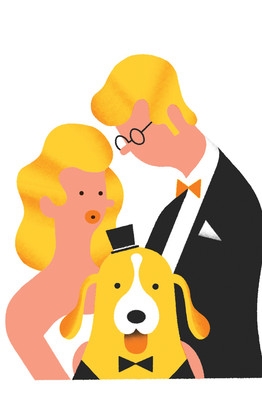
Recently, an almost literal case of lifeboat ethics occurred. On Aug. 4, Graham and Sheryl Anley, while yachting off the coast of South Africa, hit a reef, capsizing their boat. As the boat threatened to sink and they scrambled to get off, Sheryl's safety line snagged on something, trapping her there. Instead of freeing his wife and getting her to shore, Graham grabbed Rosie, their Jack Russell terrier. (One media account reported that Sheryl had insisted that the dog go first). With Rosie safe and sound, Graham returned for Sheryl. All are doing fine.
最近发生了一个关乎救生艇伦理(lifeboat ethics)的真实案例。8月4日,格雷厄姆・安莱(Graham Anley)和谢里尔・安莱(Sheryl Anley)夫妇在南非海岸附近乘快艇时撞到了暗礁,船被撞翻了。眼看游艇就要下沉,他们挣扎着想要下船,这时谢里尔的安全索被什么东西绊住了,她被困在了那里。格雷厄姆没有去解开安全索把妻子送上岸,而是抓住了他们的杰克罗素小猎犬罗西(Rosie)。(一家媒体报道称谢里尔当时坚持让狗先上岸。)罗西安全后,格雷厄姆才回去救谢里尔。目前夫妇二人和他们的狗都安然无恙。
It's a great story, but it doesn't strike me as especially newsworthy. News is supposed to be about something fairly unique, and recent research suggests that, in the right circumstances, lots of people also would have grabbed their Rosie first.
故事不错,但我没觉得有多大的报道价值。新闻素材应该是比较独特的东西,而最近的研究显示,如果形势允许的话,很多人也都会先救他们的罗西。
We have strange relationships with our pets, something examined in a wonderful book by the psychologist Hal Herzog, 'Some We Love, Some We Hate, Some We Eat: Why It's So Hard to Think Straight About Animals.' We lavish our pets with adoration and better health care than billions of people receive. We speak to pets with the same high-pitched voices that we use for babies (though when addressing pets, we typically don't repeat and emphasize key words as we do with babies, in the hope of boosting their language acquisition). As a grotesque example of our feelings about pets, the Nazis had strict laws that guaranteed the humane treatment of the pets of Jews being shipped to death camps.
我们和自己养的宠物有着奇怪的关系,心理学家哈尔・赫尔佐格(Hal Herzog)所写《为什么狗是宠物?猪是食物?人类与动物之间的道德难题》(Some We Love, Some We Hate, Some We Eat: Why It's So Hard to Think Straight About Animals)这本精彩的书对此进行了研究。我们会给予宠物很多爱,会给它们比世界上数十亿人都要好的医疗保健。我们用和对婴儿说话一样的高调门声音跟宠物说话(不过对宠物说话时一般不会像和对婴儿一样重复和强调关键字以加强孩子的语言学习)。有一个荒唐例子可以看出我们对宠物的情感,即纳粹有严格的法律规定要仁慈对待被运到死亡集中营的犹太人的宠物。
These are unique ways for one species to interact with another. On occasion, a predatory cat, after killing an adult prey, adopts the prey's offspring for a few days; these cats are usually confused adolescent females, swirling with the start of those strange maternal urges. But there is certainly no other animal that puts costumes on members of another species on Halloween.
不同物种之间会有特殊的互动方式。有时猫在猎杀掉成年猎物时会把猎物的后代养育几天;这些猫通常是处在困惑时期的未成熟雌性,奇怪的母性冲动正处于萌芽状态。但绝对没有其他哪种动物会在万 节扮成其他物种。
A recent paper by Richard Topolski at George Regents University and colleagues, published in the journal Anthrozoos, demonstrates this human involvement with pets to a startling extent. Participants in the study were told a hypothetical scenario in which a bus is hurtling out of control, bearing down on a dog and a human. Which do you save? With responses from more than 500 people, the answer was that it depended: What kind of human and what kind of dog?
佐治亚摄政大学(George Regents)的理查德・托波尔斯基(Richard Topolski)及其同事最近在《人与动物》期刊(Anthrozoos)上发表的论文指出,人类与宠物的这种关系到了令人吃惊的程度。参与研究者被告知一种假设的情形:一辆巴士横冲直撞失去了控制,马上要压到一只狗和一个人,你会救哪个?在超过500多人的回应中,答案都是看情况而定:什么样的人和什么样的狗?
Everyone would save a sibling, grandparent or close friend rather than a strange dog. But when people considered their own dog versus people less connected with them -- a distant cousin or a hometown stranger -- votes in favor of saving the dog came rolling in. And an astonishing 40% of respondents, including 46% of women, voted to save their dog over a foreign tourist. This makes Parisians' treatment of American tourists look good in comparison.
每个人都会救自己的兄弟姐妹、爷爷奶奶或亲密好友,而不会救一只陌生的狗。但在自己的宠物狗和关系不那么紧密的人――比如远房表亲或陌生的同乡人――之间,很多人都选择了救狗。令人震惊的是,40%的参与者都选择救自己的狗而不会救外国游客,包括46%的女性。这样一对比,巴黎人对待美国游客还算是不错的。
What does a finding like this mean? First, that your odds aren't so good if you find yourself in another country with a bus bearing down on you and a cute dog. But it also points to something deeper: our unprecedented attitude toward animals, which got its start with the birth of humane societies in the 19th century.
这样的研究结果说明什么?首先,如果你在另一个国家发现自己和一只可爱的狗快要被一辆巴士压到,你被救的几率不会太大。但同时也表明一个更深层次的问题:我们对动物前所未有的态度,这种态度始于19世纪动物保护组织的诞生。
We jail people who abuse animals, put ourselves in harm's way in boats between whales and whalers, carry our childhood traumas of what happened to Bambi's mother. We can extend empathy to another organism and feel its pain like no other species. But let's not be too proud of ourselves. As this study and too much of our history show, we're pretty selective about how we extend our humaneness to other human beings.
我们把虐待动物的人关进监狱,我们不顾危险在四周布满鲸鱼和捕鲸船的船上游玩,我们带着童年时期关于小鹿斑比(Bambi)妈妈的悲惨遭遇的痛苦回忆。没有哪个物种可以像我们这样对另一个有机体感同身受和感受到它的痛苦。不过我们还是不要太自傲。上述研究以及太多历史都表明,我们对给予他人慈悲和情感是相当有选择性的。













